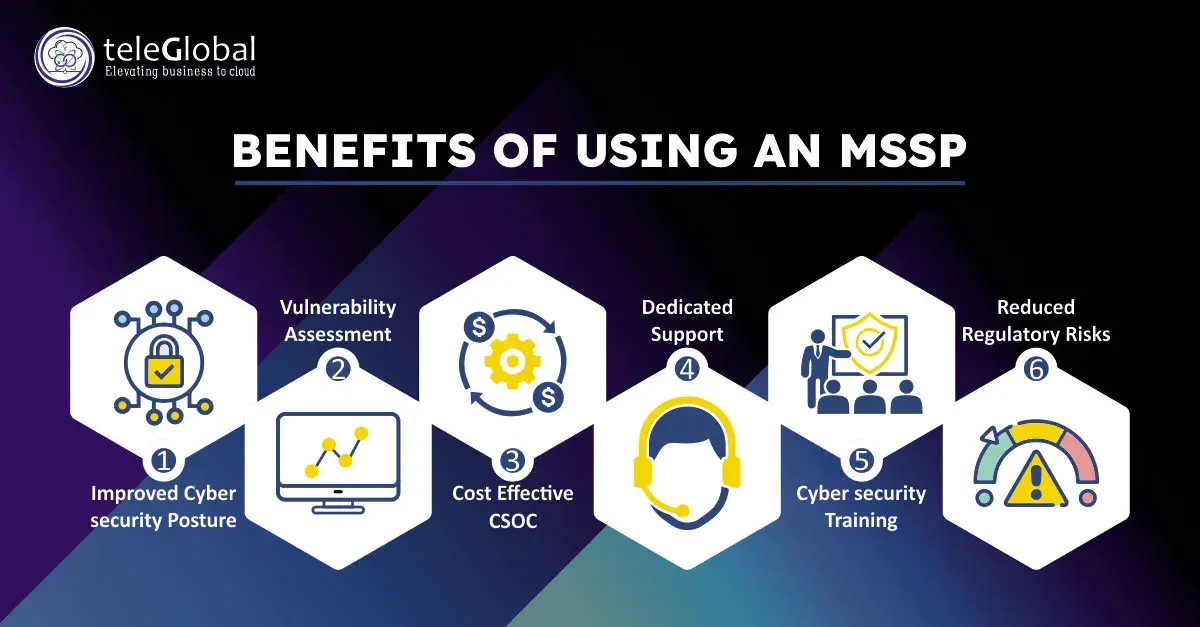Published Date :
MSSPs And Why You Should Consider Engaging One
Everything You Need to Know About Managed Security Service Providers (MSSP)
Imagine you have installed CCTV; and, say, one day it—the whole nine yards or parts thereof—happens to go missing. The first thing that probably comes to your mind is the loss of the physical device. But there is a more significant loss here—the loss of data.
This unfortunate truth underscores the fact that in the digital world, threats and their consequences are often discounted.
What’s the solution? MSSPs
The general scope of work of an MSSP is to monitor digital infrastructure, and sound an alert if any suspicious activity is noticed, for instance: spam, intrusion, hacking, (Distributed Denial of Service) DDoS attacks. If an intrusion does occur, the MSSP takes steps to respond—from minimizing damage to increasing and adapting monitoring and management to prevent recurrence of the incident/s.
MSSP Methodologies
Monitoring and managing vulnerable data round the clock, identifying threats, and containing them demands a specialized skill set. For practical purposes, this means the ideal cybersecurity solution must be able to safeguard your data on three fronts:
⦿ Hunt and Capture
Security attacks can happen anytime and come from anywhere. This means MSSPs must be watchful for security threats 24x7x365. In the event of any perceived danger, an alert must be sounder within 10 to 15 minutes of anomaly detection.
⦿ Firewall Monitoring
The purpose of a firewall is to keep out unauthorized users, secure network assets, and keep sensitive information out of the wrong hands. Thus, supervising the firewall is a key MSSP activity.
⦿ Endpoints Administration
Endpoints include IT infrastructure and user devices; these include servers, laptops, smartphones—and indeed any device that has access to the organization’s network. The more the access points, the higher the risk, which means, it is a key responsibility of the MSSP to identify threats to these endpoints, and secure data in any intrusion or attack is detected.
MSP vs MSSP
1. MSPs focus on the health of the business’s technology. They are responsible to ensure the data is accessible to whomsoever might need it—customer or employee. The MSP is responsible for the health of the infrastructure and data and access. If there are any problems on these fronts, the MSP needs to resolve them.
MSSPs on the other hand focus solely on cybersecurity and network framework, i.e. data security management. The MSSP is responsible for ensuring access to only authorized users/clients. The MSSP also monitors data and network for possible vulnerabilities and threats and makes alterations where needed
2. MSPs are responsible for aspects like efficiency and performance
MSSPs are responsible for data security. This includes prohibition/detection of threats and responding suitably.
3. MSPs are responsible for the overall health and functioning of the IT ecosystem. From a security standpoint, this includes bug fixes, system updates, and, of course, overall system administration.
MSSPs scan for malicious attacks 24×7, they pro-actively prohibit threats and respond to any threats.
Who needs an MSSP?
Access to the internet leaves you open to cyber attacks—this is an undeniable truth. Since such attacks target data, it is incumbent on organizations to secure the organization’s data and counter these attacks. The MSSP takes on this responsibility. In addition, to eradicating cyber attacks, the MSSP also provides security alerts on threats to data or vulnerabilities. They do this by proactively managing and monitoring network movement, possible malicious activity at endpoints, or any anomalies, and take appropriate countermeasures.
Benefits of using an MSSP
MSSPs remove the responsibility of security from the organization’s people, leaving them free to focus on core business. This allows the organization to deliver better output to customers and better productivity and profitability to stakeholders.
While every organization requires state-of-the-art cyber security, few can really afford it. But without security, there is a significant risk of loss of both reputation and data. working with an MSSP allows the organization to leverage a professional and thorough approach toward security from skilled experts, at an affordable cost.
Faster response and better defense from MSSPs keep an organization’s data away from prying eyes and attacking vectors.
Adoption of new, next-gen technologies, like IoT & cloud computing, helps organizations raise the level of their offerings and efficiency, but they also invite more threats. Working with a dedicated MSSP ensured the landscape is free of threats.
Managed Security Services Categories
⦿ Network Architecture Maintenance management
This area of MSSP centers on the security of the network architecture. It includes such services as updating security systems, reporting, and recommendations for ongoing and future data protection.
⦿ Threat Detection and Alerts Management
Services like Intrusion Detection Systems (IDS) or Intrusion Prevention Systems (IPS) are two other areas of specialization that MSSPs rely on to detect malicious or questionable activity.
⦿ Spot Checking and Staff Augmentation
Organizations often need to take on temporary staff, someone could have fallen ill, taken a sabbatical, or could be on maternal/paternal leave. This holds true for their cybersecurity teams too. This service usually comes into play when a team member with the requisite skills is missing and new security measures need to be incorporated into the systems.
⦿ SIEM
Security Information and Event Management (SIEM) is a specialized field within the domain of computer security. It refers to the delivery of security information management and security event management for a combination of software products and services. SIEM specialists provide real-time analysis of security threats by applications and network hardware.
⦿ Security Endpoints Management
Endpoints—servers, laptops, mobile devices, tablets, etc. that are connected to the internet are all vulnerable to cyber-attacks. Endpoint security management is a particular area of MSSP work that enables organizations to safeguard their endpoint devices from attacks.
Evaluating MSSPs
The first step in partnering with an MSSP is to check your own requirements—this includes needs from the possible expansion of your business. Only after thoroughly understanding one’s own requirements can an organization begin to shortlist ideal MSSPs.
After you shortlist MSSPs, evaluate each one for their services capabilities, SLAs, etc.
Need help with your cloud?
"No worries! Our experts are here to help you. Just fill the form and we'll get back to you shortly!"
Our Partners


 +919356301699
+919356301699 hello@anetautomation.com
hello@anetautomation.com
